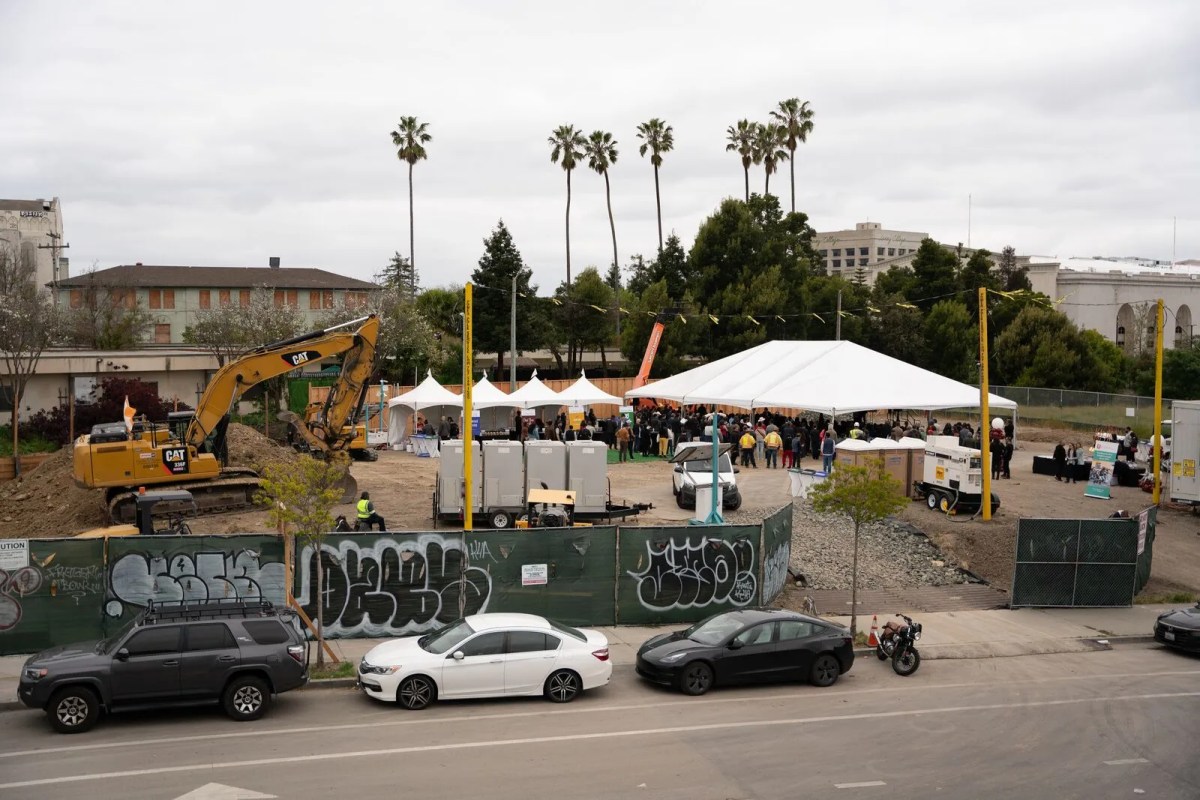Relief and excitement reverberated at the groundbreaking for an affordable housing project near Lake Merritt on Tuesday. Nonprofit developer East Bay Asian Local Development Corporation, or EBALDC, is beginning construction on a 91-unit building for low-income residents, including 23 apartments reserved for formerly homeless residents.
Officials plunged ceremonial shovels into the ground, marking the end of a political rollercoaster and the final outcome for a long-vacant piece of land.
“I’m elated,” Oakland City Council President Nikki Fortunato Bas told The Oaklandside. “Some of us thought that this day would never come.”
Over the course of a decade, multiple plans for the land at E. 12th Street and 1st Avenue have been approved, squashed, disputed, and delayed. The site is known as a “remainder parcel” because it was left over when E. 12th was realigned in 2013.
In 2015, the Oakland City Council agreed to sell the land to the private developer UrbanCore, which planned to build a market-rate apartment tower. But a city legal memo leaked to the press at the time found the deal violated a local law requiring public land to be offered to affordable housing developers first.

So Oakland opened up a bidding process, and once again chose UrbanCore to buy the site, this time along with EBALDC. The two developers planned to construct separate buildings, one with 252 market-rate units and 18 middle-income units, and one with 91 affordable apartments.
The plans never came to fruition. UrbanCore, headed by developer Michael Johnson, received numerous extensions from the city to give his company a chance to shore up its financing. When the pandemic hit, stalling local development, Johnson asked for more time. In the meantime a large homeless encampment was established on the remainder parcel, and in 2021 the city opened a temporary tiny-house shelter in its place.
In early 2022, the City Council canceled the UrbanCore project. A few months later, officials approved the current EBALDC project there. It’s similar to the building that was going to accompany UrbanCore’s. Pyatok is the architect.
The building will house residents making between 20-60% of the Area Median Income, which is up to about $59,000 for a single person or $75,712 for three people.
Another nonprofit developer, Satellite Affordable Housing Associates, or SAHA, is pursuing a second, 94-unit affordable building for the western portion of the lot. This time, Oakland entered into long-term leases with the developers instead of selling them the land.
On Tuesday, speakers from EBALDC and other organizations working on the project, including the Unity Council, Jordan Real Estate Investments, and the Oakland Housing Authority, referenced years of “twists and turns” and rattled off names of dozens of officials and organizations involved in finally bringing bulldozers to the site. They celebrated the prospect of children, older residents, and workers moving into the range of studios to three-bedrooms now under construction.
“This neighborhood is majority POC and majority renter,” Bas said to the 300-person crowd. “This project meets the neighborhood where it’s at to stem the displacement.”

She told The Oaklandside she considers the project the reason she was first elected to the council in 2018. Early in the discussions around the future of the remainder parcel, a neighborhood group called Eastlake United for Justice advocated for fully affordable development there. The neighbors worked with SAHA to create a “people’s proposal” for the site, similar to what the developer is now pursuing.
Bas said the advocates wanted someone who’d represent the community interests in office in District 2. In the years since, she’s pushed for what she calls using “public land for public good,” including by facilitating the opening of the interim homeless shelter.
The $102 million EBALDC project is the first Measure U-funded building to break ground in Oakland. The whopping $850 million infrastructure bond approved by voters in 2022 includes $350 million for affordable housing. Only some of the funds have been distributed so far, focusing on projects already in the city’s “pipeline.”
The E. 12th project received $15.5 million from Measure U along with a range of state, federal, and private funds.

Supporters of the original UrbanCore plan had argued that the market-rate apartments could help fund the affordable development. That project had more overall units than what’s currently underway and proposed on the lot, but half the number of affordable apartments.
According to EBALDC, their project is also the first in Oakland to be entitled through Assembly Bill 2162, a 2018 law that required cities to automatically approve projects that contain a certain amount of supportive housing.
SAHA and Eastlake United for Justice are holding community engagement sessions to seek input on the proposal for the other half of the lot. The developer has an exclusive agreement with Oakland to build on the site but the final project will still need approval from the City Council.

